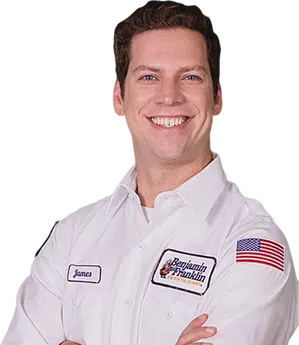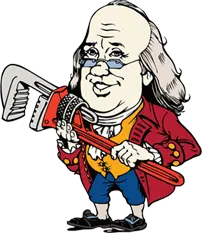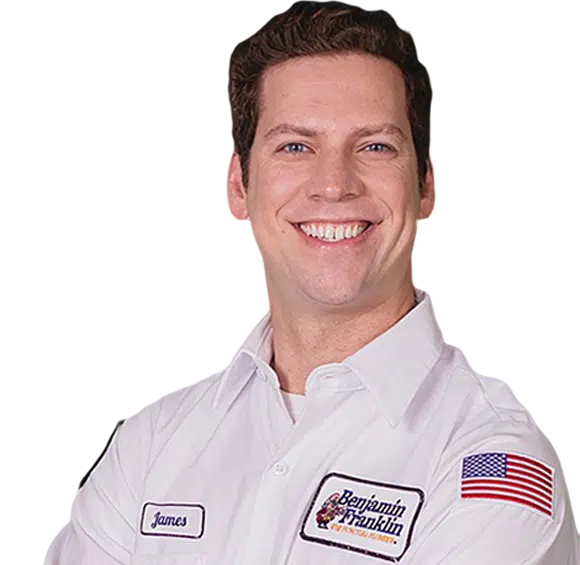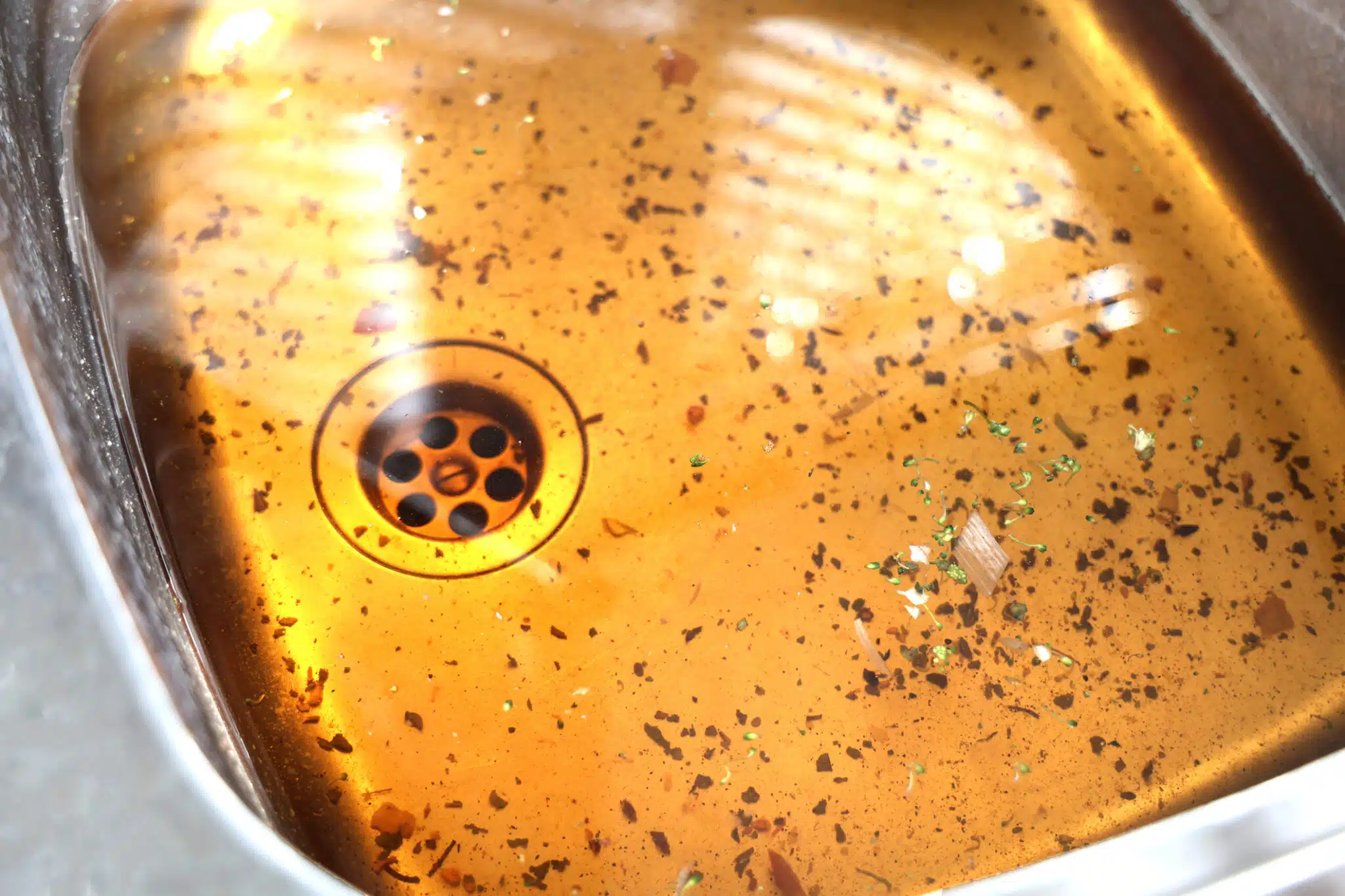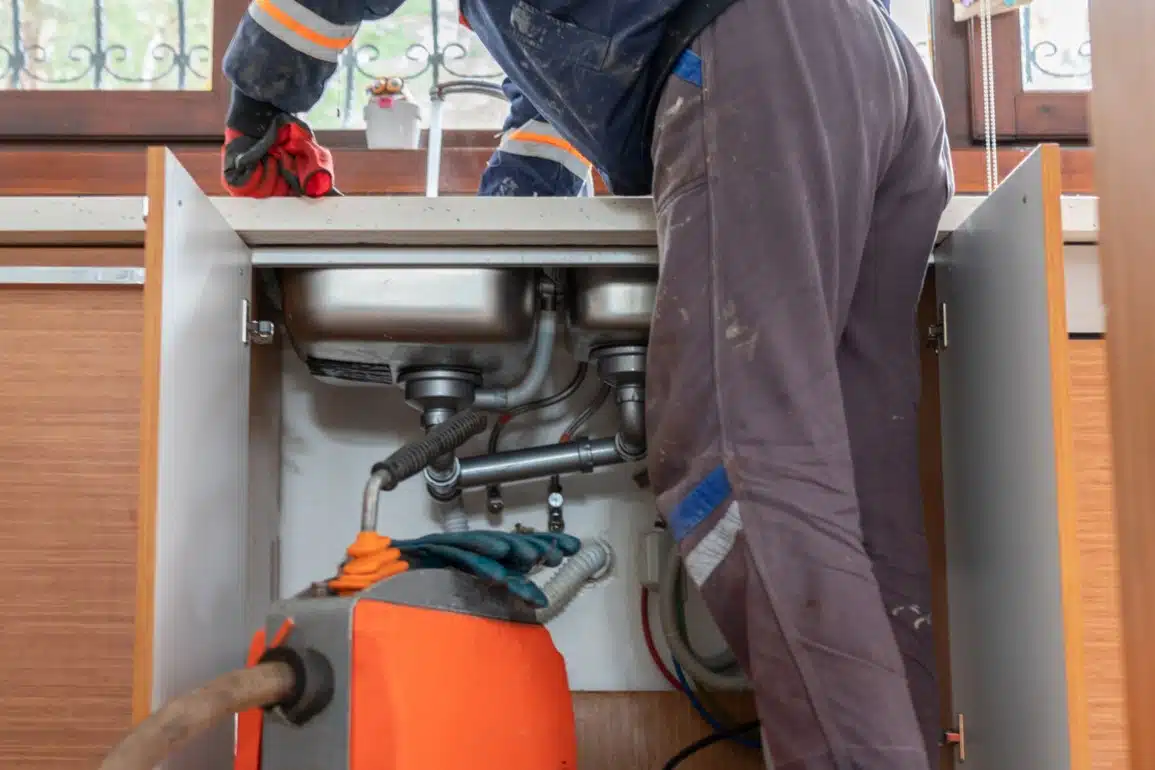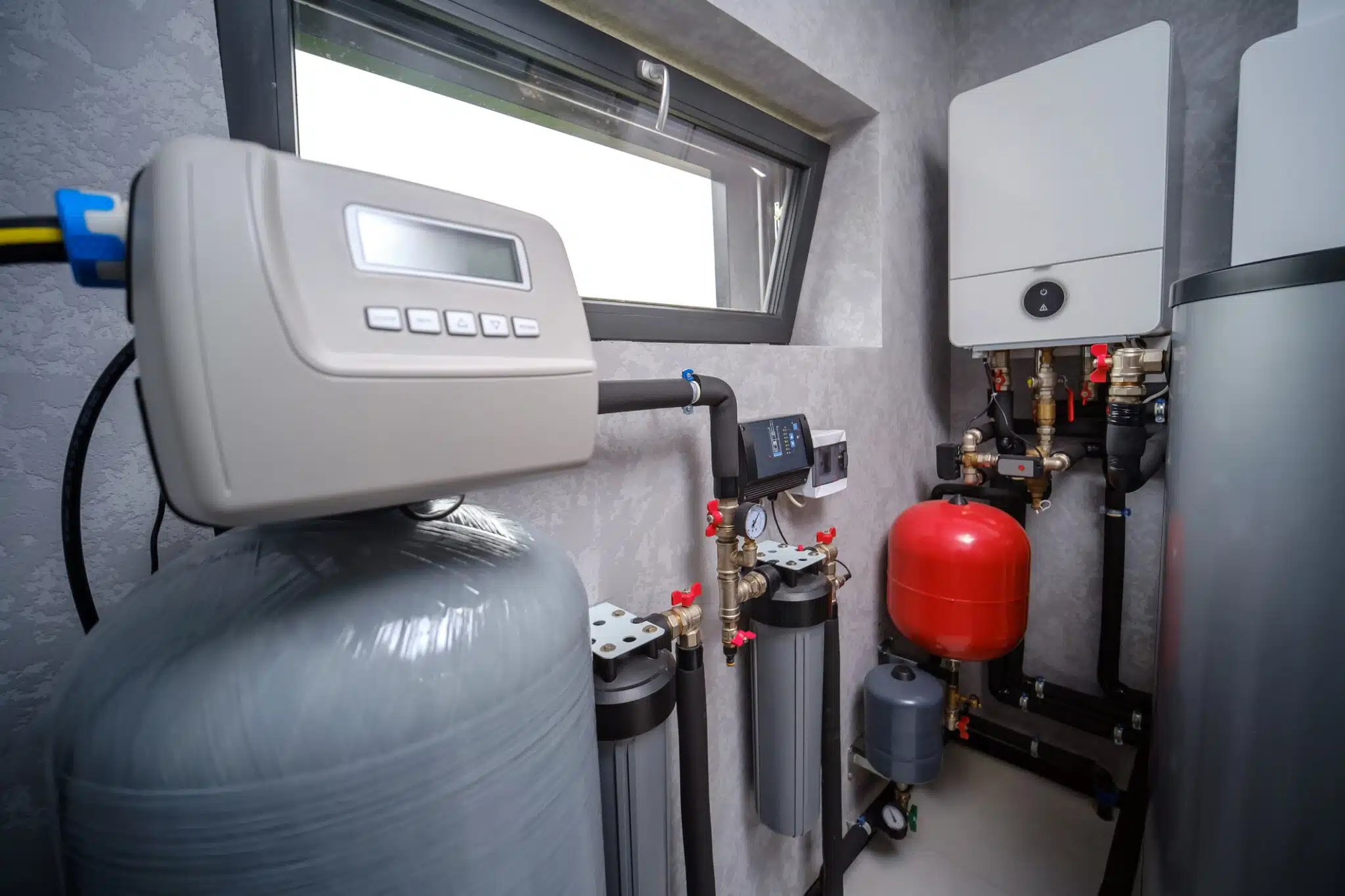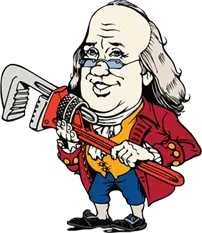Stop clogs in your Lancaster kitchen by disposing of food waste properly, cleaning drains regularly, and using drain screens. Make sure your sink is designed right and keep grease traps in good shape. Regular upkeep and eco-friendly fixes also help in preventing clogs.
Why Kitchen Drains Clog
Ever wonder why your kitchen sink clogs so often? Clogs are usually due to food waste, grease, and small objects slipping down the drain. Leftover pasta, coffee grounds, and other food bits can build up and block your drain.
Grease and oil are also big problems.
They go down hot but harden and block the pipes once they cool. Don’t forget about small objects—forks, sponges, and even toys—that find their way into the drain.
Natural stuff like hair and oils are common cloggers too. This led to drain cleaners being made, both chemical and mechanical.
Hydro-mechanical drain cleaners are great; they use just tap water to clear out clogs like sand or kitty litter. So, if your sink is slow to drain, think about these causes and use the right tools to fix them. If you are in Lebanon, PA, and dealing with persistent clogs, local professionals can easily assist you.
How to Prevent Kitchen Clogs
Sick of dealing with kitchen clogs? Keep your sink clear by following smart habits and regular care. Here are our top tips.
Dispose of Food Waste Properly
First, watch what goes down your drain. Don’t flush food scraps, coffee grounds, or eggshells. These can build up and block your pipes. Scrape food waste into the trash or compost bin. Using a garbage disposal? Run cold water before, during, and after to help break down food bits.
Clean Your Drain Regularly
A regular cleaning routine can stop build-ups. Pour boiling water down your sink once a week to dissolve grease and wash away small debris. If you like DIY fixes, use a mix of baking soda and vinegar to keep your pipes clear. Let it sit for 15 minutes, then flush with hot water.
Use Drain Screens
Need a way to keep small stuff out of your drain? Drain screens can help. Place them over your kitchen sink and shower drains to catch food bits and hair. They’re easy to clean and worth it.
By following these steps, you can keep your kitchen running smoothly. Benjamin Franklin Plumbing of Lancaster, PA, is here to help if you need a pro in Lebanon, PA. Regular care stops those pesky clogs! So, use these tips and enjoy a clog-free kitchen.
The Role of Kitchen Sink Design in Preventing Clogs
Did you know your kitchen sink design can help prevent clogs? Choosing the right sink makes a big difference in how easy it is to use and clean. A sink with a built-in garbage disposal can stop food waste from causing clogs.
A double-basin sink is a great choice for keeping clogs at bay. These sinks let you separate washing and rinsing, which helps keep food and grease from building up and causing blockages. Plus, you can install drain screens in both sections for extra protection.
Think about the depth and material of the sink, too. Deeper sinks give more room for water to flow, reducing the chance of overflow. Materials like stainless steel are easier to clean and maintain.
If you’re planning a kitchen remodel in Lebanon, PA, remember that a good sink design and regular care can save you from clogs and plumbing costs. For expert advice tailored to your kitchen, reach out to Benjamin Franklin Plumbing of Lancaster, PA—your local plumbing specialist.
The Importance of Grease Traps in Kitchens
Ever wondered why your kitchen sink keeps clogging despite your best efforts?
It might be because you’re ignoring the role of grease traps. These handy devices, installed under the sink, catch greasy and oily stuff that could clog your drains.
Grease traps slow down wastewater, letting fats, oils, and grease cool and harden before they reach the sewer lines. Taking care of your grease trap is key. Clean it at least every three months to stop nasty build-ups and avoid costly repairs.
A simple tip is to scrape food scraps and grease into the trash before washing dishes. This habit helps prevent clogs.
Also, check your grease trap for any blockages regularly. If you’re in Lebanon, PA, call Benjamin Franklin Plumbing of Lebanon, PA for expert help and maintenance. With proper care, your grease trap can extend the life of your plumbing and save you some headaches.
By understanding and valuing your grease trap, you’re closer to a clog-free kitchen.
Simple, Green Ways to Stop Clogs
Want to keep your kitchen pipes clear and be kind to the Earth? Try using natural enzymes. These enzymes break down food and grease, keeping water flowing and not harming nature. Also, biodegradable soaps clean your dishes and keep pipes free of clogs. Unlike harsh chemicals, these soaps are gentle on plumbing but still get the job done.
This makes them a smart choice for green-minded folks in Lebanon, PA. Cutting grease build-up can be easy, too. Scrape plates into a compost bin before washing. Use grease traps to catch fats and oils, keeping them out of your pipes. If you maintain them well, they can reduce clogs.
Hot water is another helper.
Regularly rinsing with hot water melts away grease and food bits, preventing clogs. Small changes in your kitchen routine can make a big difference. By using these green methods, you’re not just protecting your plumbing—you’re also helping the Earth. Smart choices lead to big benefits!
Regular Ways to Avoid Clogs
Sick of dealing with kitchen clogs? Setting up a regular drain cleaning routine can save you from surprise headaches and costs.
Flush your drains with hot water once a week.
This simple step helps break down any grease or soap stuck in there. Keeping your kitchen pipes in good shape takes more than the occasional fix. Getting the pros from Benjamin Franklin Plumbing of Lebanon, PA to inspect your lines can spot issues before they get worse.
Regular check-ups keep your pipes in good shape, preventing small problems from growing. Cleaning your drains often helps avoid nasty build-ups. Try using natural enzymes to keep your pipes clear.
These eco-friendly solutions are safe and effective, breaking down gunk without harming your plumbing. Drain screens are another great tool in your fight against clogs. These simple devices catch food bits and debris before they go down the drain, cutting the risk of blockages. Taking care of your drains with regular care and professional help is a smart move for home comfort and efficiency.
Make clog prevention a habit and enjoy a smoother, trouble-free kitchen.
How Water Quality Affects Your Drains
Do you know how the quality of your water affects your kitchen drains? Hard water and soft water can impact your plumbing in different ways. Hard water is full of minerals like calcium and magnesium.
Over time, these minerals can build up and cause clogs in your pipes. On the other hand, soft water has fewer minerals and reduces the risk of clogs. One solution is to install a water softener. These devices lower the mineral content in your water and stop scale and sediment from forming.
Experts say a good water softener can help your plumbing last longer and work better. In places like Lebanon, PA, water quality can vary a lot. Benjamin Franklin Plumbing of Lancaster, PA can inspect your water and offer solutions.
Good water quality isn’t just about taste; it’s also about keeping your kitchen drains healthy. So, while cooking and cleaning are important, don’t forget about your water quality. It’s a small change that can make a big difference in preventing clogs and keeping your kitchen running smoothly.
Seasonal Tips for Preventing Kitchen Clogs
Are you tired of dealing with kitchen clogs every season?
Keep your kitchen in Lebanon, PA clog-free all year with these tips from Benjamin Franklin Plumbing of Lancaster, PA.
Winter Tips
Winter can be tough on your plumbing because of the cold. Insulate your pipes to stop them from freezing and cracking. Don’t pour grease or oil down the drain; they harden in the cold and cause clogs. Run hot water often to keep things moving. Installing heat tape on exposed pipes can also save you from clogs during the cold months.
Summer Tips
Summer means more family parties and more dishes, which can strain your plumbing. Use drain screens to catch food bits and stop them from going down the drain. Regularly flush your drains with hot water and vinegar to break down build-up.
Summer is also a great time for a plumbing check to spot problems before they get big. And when you’re out enjoying the sun, ask someone to run water now and then to keep your pipes healthy. By taking these seasonal steps, you can enjoy a clog-free kitchen all year. For more advice or help, contact Benjamin Franklin Plumbing of Lancaster, PA.
The Link Between Plumbing and Kitchen Cleanliness
Did you know bad plumbing can mess up your whole kitchen’s hygiene? It’s true! Stopping kitchen clogs isn’t just about avoiding a blocked drain; it also keeps your food area clean and safe.
Stopping Mold and Mildew: Clogs can cause moisture to build up, leading to mold and mildew. These fungi love damp places and can make you very sick. Keeping your drains clear helps prevent water from pooling and stops these harmful growths.
Clean and Safe Water: The quality of water in your kitchen is also important. Clogs can make water stagnant, which can get contaminated. Regular maintenance and quick fixes make sure your water stays clean and safe to use.
In short, plumbing upkeep isn’t just about working drains; it’s about keeping your kitchen hygienic. For expert help with kitchen clogs, contact Benjamin Franklin Plumbing of Lebanon, PA. They know how to keep your kitchen running smoothly and safely.
A clog-free kitchen is a happy, healthy kitchen!
Top Tools for DIY Clog Prevention
Want to tackle clogs on your own? Smart homeowners in Lebanon, PA know the right tools can make a big difference. Plungers and drain augers are must-haves for a clog-free kitchen.
A good plunger can fix minor blockages by creating suction to quickly clear small clogs. For tougher jobs, a handheld drain auger, which can reach up to 25 feet into the drain, can remove stubborn clogs caused by food scraps or grease.
Another handy tool is the drain snake. This flexible tool can go through the twists and turns of your pipes to clear hair, grease, and other debris. To use a drain snake, insert it into the drain and turn the handle to catch the clog, then pull it out.
Regular use of these tools, along with routine drain maintenance and eco-friendly cleaners, can keep your kitchen running smoothly. But for persistent problems or tricky clogs, don’t hesitate to reach out to professional plumbing services like Benjamin Franklin Plumbing of Lancaster, PA.
They ensure peace of mind and a clog-free kitchen.
When to Call a Plumber for Clogs in Lancaster
Is your kitchen sink not draining despite your efforts? Knowing when to call a plumber for clogs can save you stress and stop more damage.
One big sign you need help is if your DIY methods, like using a plunger or a small drain snake, aren’t working.
Small drain snakes usually clean up to 25 feet down. If the clog is farther, you need an expert. If your sink drains slowly, that’s another warning. This might mean a bigger problem in your plumbing that only a pro, like Benjamin Franklin Plumbing of Lancaster, can fix.
Strange noises or bad smells from your drains are also signs to call in the experts. Hair, grease, or oils often cause clogs, and while there are chemical cleaners and tools, using them wrong can make things worse. Choosing a good plumber is crucial. Look for well-reviewed services with proven reliability.
In Lebanon, PA, Benjamin Franklin Plumbing of Lancaster stands out with its expert knowledge and great service. Their team can fix your clog issue and give you tips to keep your kitchen sink running smoothly.
Benefits of Regular Plumbing Check-ups in Lebanon, PA
Tired of unexpected plumbing issues at home?
Regular plumbing check-ups can make a big difference for homeowners in Lebanon, PA. Getting your plumbing system checked can save you money by spotting problems early before they turn into costly repairs. Simple steps can help you avoid the trouble of clogs, leaky pipes, and broken fixtures.
Routine check-ups from pros like Benjamin Franklin Plumbing of Lancaster, PA, can make your plumbing system last longer. Regular maintenance helps catch small issues early, reducing the wear and tear on your system. This means fewer emergencies and a more steady supply of clean water.
Also, folks in Lebanon, PA can benefit from inspections that make sure their plumbing meets local codes and standards. This is especially important for older homes with outdated systems that might have more problems with clogs. Regular plumbing check-ups aren’t just about stopping issues; they’re about peace of mind. Knowing your plumbing is in great shape lets you focus on other parts of home care and enjoy a worry-free life.
FAQs
-
How can I stop kitchen clogs?
Don’t put grease, oil, or big food bits down the drain. Scrape food scraps into the trash and keep a container for fats and oils.
-
What signs mean I need a pro for a clogged drain?
If you see slow drainage, frequent backups, bad smells, or gurgling sounds, call a plumber like Benjamin Franklin Plumbing of Lebanon, PA. These signs could lead to bigger problems if ignored.
-
Are there green ways to stop clogs in my kitchen drains?
Yes, use natural enzyme cleaners and biodegradable soaps. They work well and are good for your pipes and the planet.
-
How often should I get my drains cleaned by a pro?
Get a professional drain cleaning once a year to keep your drains in good shape. Regular cleanings can stop big clogs and help your plumbing last longer.
-
What tools do I need to stop clogging myself?
A plunger and a drain snake are key tools. Handheld drain augers work too, especially for clearing clogs effectively. Use these tools right to avoid harming your pipes.

